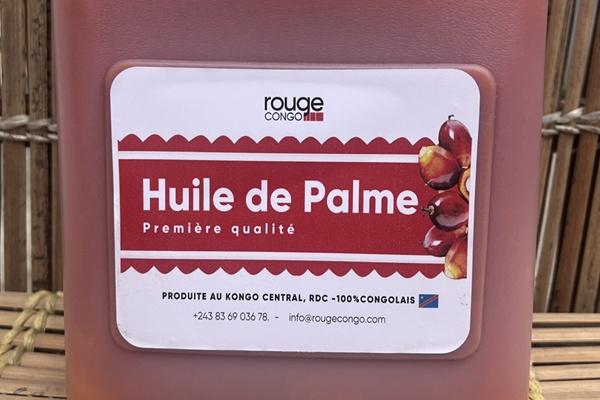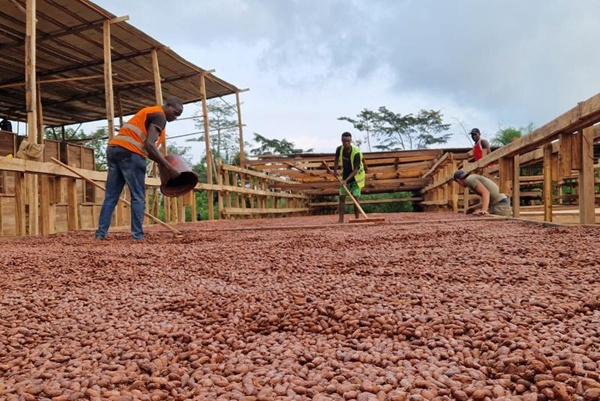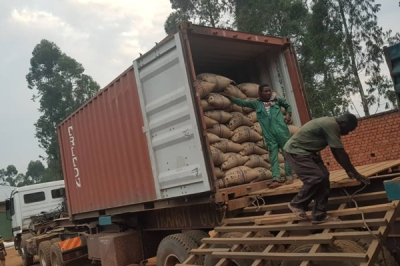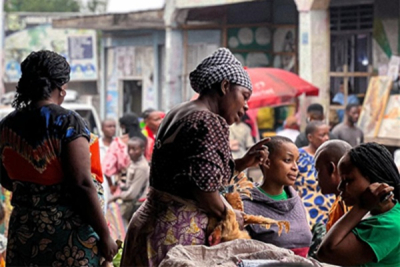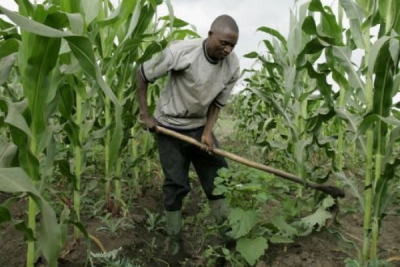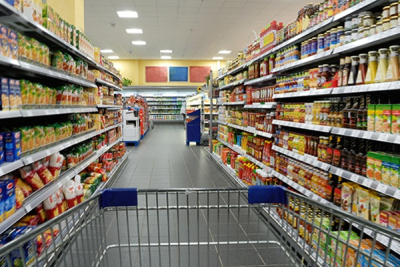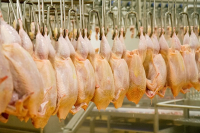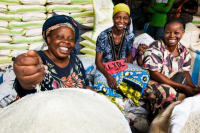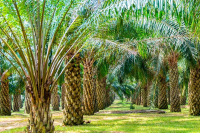
AGRICULTURE (32)
On March 10, 2025, the price of a 25-liter drum of palm oil from Bandundu province surged by nearly 36%, climbing from 70,000 to 95,000 Congolese francs (CF) in Kinshasa markets. This sharp increase reflects a broader trend observed across the Democratic Republic of Congo (DRC).
In Bunia, Ituri province, the price of a 20-liter can rose from CF60,000 to CF85,000 on March 4 a jump of 41%. Similarly, in Kikwit, Kwilu province, prices skyrocketed by 73% between January 15 and January 22, with a 25-liter drum rising from CF30,000 to CF52,000. Matadi, the capital of Kongo-Central, saw prices double in February, reaching CF60,000 for a 25-liter drum.
According to various media outlets quoting different sources, several factors are behind the price surge. Seasonal drought from January to March has significantly reduced palm oil production, particularly in northern provinces along the equator. At a February 5 meeting with the Minister of Agriculture, producers cited drought as one of the major challenges affecting plantations. Additionally, the advance of M23 rebels and their Rwandan allies in key production zones like North Kivu has disrupted supply chains and limited access to products.
The opening of new palm oil processing plants, such as Tshela, also boosted demand for palm nuts, subsequently exacerbating pressure on prices.
Despite its vast agricultural potential 60% of the DRC's estimated 280 million hectares are suitable for oil palm cultivation—the country struggles to meet domestic demand. By 2023, national consumption exceeded 500,000 tonnes annually, forcing palm oil to rank among the top five food imports. Kalaa Mpinga, Chairman of the FEC's National Agriculture and Forestry Commission, emphasized this gap in production capacity.
To address these challenges and boost production, the DRC plans to join the Council of Palm Oil Producing Countries (CPOPC) in 2025. Meanwhile, discrepancies in volume estimates highlight the need for better structuring within the sector.
This article was initially published in French by Boaz Kabeya (intern)
Edited in English by Ola Schad Akinocho
Agricultural and agri-food exports from the Democratic Republic of Congo (DRC) reached a record $433 million in 2024, according to a recent report from the U.S. Department of Agriculture (USDA), which cited data from the Trade Data Monitor (TDM) platform. The figure compares with around $300 million in 2023 and less than $250 million in 2020.
While the report does not specify the exact factors behind this growth, it highlights that coffee and cocoa two of the DRC's top agricultural exports, and wood is the third saw substantial price increases in international markets last year.
The average annual price for Arabica rose to $4,099 per tonne in 2024, up 7.89% year-on-year. Robusta, which comprises over 70% of Congolese coffee production, reached an all-time high of $5,528 on November 28, 2024, closing the year with an average price of around $5,000 per tonne, up from approximately $2,400 at the start of 2024.
Cocoa prices also surged dramatically, climbing from $3,855 per tonne at the beginning of 2024 to $12,931 on the New York Stock Exchange by December 18 up by 172%.
Despite these impressive export figures, the USDA report indicates that the DRC remains in a trade deficit. Agricultural and food imports exceeded $1.9 billion in 2024, resulting in a deficit of about $1.46 billion. President Félix Tshisekedi noted in his State of the Nation address on December 11, 2024, that food imports cost the country approximately $3 billion annually.
This trade imbalance both strains the DRC's foreign currency reserves and highlights opportunities for developing local agricultural production to reduce reliance on imports. With over 80 million hectares of arable land available, there is considerable potential for growth in domestic agriculture.
According to TDM data for 2023, key food imports include palm oil, wheat, vegetables, meat, and dairy products. The DRC primarily sources food from the European Union, Zambia, Brazil, South Africa, and Namibia.
Espoir Olodo
The price of Arabica coffee, a key export for the Democratic Republic of Congo (DRC), has surged on international markets. According to Reuters, As of February 12, 2025, Arabica futures were trading at approximately $4 per pound, or $8.80 per kilogram.
The surge is mainly attributed to rising transaction costs on the ICE exchange, where margins have been raised by 10% to $10,410 per contract nearly double what they were a year ago. As a result, many traders have liquidated their positions, further driving up prices.
The DRC's Ministry of Foreign Trade reported a 7.89% rise in the price of a kilogram of Arabica coffee on international markets. Between February 10 and 15, 2025, the price climbed to $7.38, up from $6.84 the previous week.
A study by the University of Liège in Belgium suggests that higher international coffee prices could benefit Congolese producers. However, the country’s eastern region, where most coffee is produced, is currently at the heart of conflicts opposing the Congolese army to invaders–M23 rebels and their Rwandan allies. The storm threatens the Arabica coffee-producing areas in North and South Kivu and Ituri. The invaders have already taken over Bukavu and Goma, the provincial capitals of South Kivu and North Kivu.
Beyond the conflict, the coffee sector grapples with numerous challenges including low productivity, deteriorating infrastructure, and rampant illegal exports. In Ituri province alone, over 80% of the coffee produced is clandestinely exported to neighboring countries, according to recent data from the Office National des Produits Agricoles du Congo (ONAPAC), limiting potential income for the DRC.
The country produced 12,422 tonnes of coffee in 2023, up from 10,729 tons in 2022. According to the data, disclosed by the Central Bank of Congo (BCC), Robusta made up over 70% of the output in 2023, and the rest was Arabica.
This article was initially published in French by Boaz Kabeya(intern)
Edited in English by Ola Schad Akinocho
Food prices have soared in Goma since M23 rebels and their Rwandan backers took over the town on January 26, 2025. A report by ActionAid published on February 3, indicated that essential goods, including flour, beans, and oil, have seen price increases of 18% to 160% within a week.
The road blockades, a key factor in the price surge, have disrupted food supplies to the city, nested in the eastern part of the Democratic Republic of Congo (DRC). According to ActionAid, nearly 90% of Goma's food supply comes from neighboring regions now inaccessible due to the conflict.
A resident quoted by Radio Okapi reported improvements since February 4. “Roads reopened, and large quantities of food can come from Minova, Masisi, and Rutshuru.” The same source, however, added that household purchasing power has been diminished. “Banks are closed, several services are not operational, several shopkeepers have been looted and many residents reduced to unemployment,” the resident said.
The resulting food crisis threatens hundreds of thousands with malnutrition, with women and children at greatest risk. The World Food Programme (WFP) estimates that 4.5 million children under five and 3.7 million pregnant and breastfeeding women could suffer acute malnutrition in the next five months if things remain unchanged.
Olivier de Souza
The DR Congo government should promulgate its new agricultural and seed laws before the end of May 2025. President Félix Tshisekedi disclosed the timeframe in his State of the Nation address to Parliament on December 11, 2024. The laws will be accompanied by other measures to bolster agricultural governance in the country.
The additional measures will include an agricultural cadastre, land use plans, and a complete database of all stakeholders in the agricultural sector.
While no specific timeline for parliamentary adoption has been provided, observers are optimistic that these laws could improve the business environment for current and potential investors.
For years, stakeholders have criticized Article 16 of the 2011 Agricultural Law, which mandates that 51% of shares in commercial agricultural enterprises be held by nationals, against 49% by foreign investors. According to the World Bank, this measure could deter foreign investment in the agro-industrial sector.
The forthcoming seed law would be a major milestone in developing the DRC’s seed industry. Last October, the government announced plans to spend around $18 million to build a seed analysis laboratory and/or set up a national seed service by 2026.
This article was initially published in French by Espoir Olodo
Edited in English by Ola S. Akinocho
The Democratic Republic of Congo (DRC) spends $3 billion on food imports annually on average. President Félix Tshisekedi disclosed the figure in his State of the Nation address to Parliament on December 11, 2024.
DRC’s heavy reliance on foreign markets not only results in significant foreign currency losses but also leaves the country vulnerable to global commodity price fluctuations.
The massive imports also deprive local producers of a substantial share of the agri-food market, as the country underexploits its arable lands which span around 80 million hectares.
Several agri-food value chains remain undeveloped, awaiting investment to satisfy local demand and position the DRC as a key player in intra-regional trade.
Key sectors like cassava and corn significantly impact the rural economy and offer opportunities for value addition through processing. Additionally, rising consumption of animal products and fruits, driven by urbanization, presents major prospects for the livestock and horticultural sectors.
For instance, tomato consumption is increasing, with imports of juice, purée, and fresh fruit exceeding $12 million in 2022, according to FAO data.
Investment in irrigation could further leverage the DRC's abundant water resources, which include 900 million cubic meters of surface water and 420 million cubic meters of groundwater.
While awaiting greater private sector involvement, Tshisekedi emphasized the government's commitment to agricultural development. Under the 2024-2028 Action Program, over 200 agricultural enterprises have received exemptions for importing agricultural equipment, and farmers have benefited from 350 tractors this season.
The upcoming 2025 Finance Act is set to allocate more than 11% of total public spending to agriculture—a significant step toward fulfilling the DRC's commitment made in Maputo in 2003 to dedicate 10% of public expenditure to agriculture and achieve annual growth of 6%.
This article was initially published in French, by Espoir Olodo
Edited in English by Ola Schad Akinocho
President Félix Tshisekedi called for greater investment in local agriculture during last week’s Council of Ministers. According to the council’s report, the leader’s call stems from "the scale of the food and socio-economic challenges and the urgency of action."
The Democratic Republic of Congo (DRC) faces several challenges relative to agriculture; including growing demand for staple foods, the necessity to protect household purchasing power, and economic diversification. In this context, the government is committed to accelerating agricultural development, reducing imports of basic foodstuffs, and reinforcing food security throughout the country.
The 2024-2025 agricultural campaign kicked off on October 17, in Kinshasa. On this occasion, provincial governors received improved seeds, fertilizers, farming equipment, and rolling stock. The move aims to better support local farmers and help them increase their output.
“To address recurring shortages of essential agricultural products, like corn, the President has instructed the Minister of State for Agriculture, and his cabinet, to assess government interventions supporting the ongoing agricultural campaign and to effectively prepare for the upcoming season, which begins in a few weeks,” the Council reported.
Greater Coherence
To rationalize resource allocation for various agricultural projects and programs currently being developed or implemented, President Tshisekedi announced a high-level meeting for early 2025. This meeting will gather key stakeholders and development partners to ensure "the completion of reflection on the coherence of all agricultural initiatives carried out by various ministries and structures attached to the Presidency of the Republic, as well as other state services."
Agricultural policies and related initiatives, including building agricultural feeder roads, have been central to the new government's actions since taking office. The private sector is also actively involved in several initiatives, including a project by Swiss company Mole Group in Central Kongo, which aims to invest close to one billion dollars.
The African Development Bank has provided over $265 million to develop agricultural skills, alongside funding from the World Bank and Agence Française de Développement. In its priority investment program for 2025-2028, the government plans to allocate approximately $265 million towards research, improving agricultural production, and developing predominantly agricultural rural areas.
This comprehensive approach reflects a commitment to enhancing food security and promoting sustainable agricultural practices in the DRC while addressing pressing socio-economic challenges plaguing the Congolese people.
This article was initially published in French, by Georges Auréole Bamba.
Edited in English by Ola Schad Akinocho
The Democratic Republic of Congo (DRC) could absorb 130,000-140,000 tons of chicken meat from the European Union (EU) this year. Bankable made the estimate based on a recent US Department of Agriculture (USDA) poultry report covering the EU.
This volume would set a record and solidify the DRC's position as the EU’s third-largest chicken meat buyer. The UK and Ghana are first and second, with 725,000 tonnes and over 200,000 tonnes, respectively.
The DRC’s poultry meat imports from the EU doubled between 2019 and 2021, reaching 120,000 tonnes. However, they fell below 100,000 tonnes in 2023. According to the USDA, poultry meat shipped from the EU to the DRC and other African markets primarily consists of frozen, mechanically deboned dark meat.
The anticipated increase in chicken meat imports from the EU in 2024 is largely attributed to its low price, which allows consumers to meet their growing demand for animal protein. According to data from Trade Data Monitor (TDM) compiled by the USDA, between January and June this year, the FOB price (free on board) for a tonne of European chicken meat destined for the DRC was less than $1,000. In comparison, prices were almost $4,000 for Guinea and around $2,250 for Benin.
A 2018 study by the Dutch Agronomic University of Wageningen estimated that an imported chicken costs around $2.30 in the country of origin, which is already lower than the feed costs for producing a chicken in Kinshasa.
Local producers face significant challenges due to major constraints such as lack of capital and limited access to inputs (particularly feed and veterinary products), which undermine their competitiveness. There are also concerns about dumping practices, that are criticized by NGOs. Indeed, some manufacturers have been taking advantage of export and input subsidies to send products at prices that local players in Africa cannot compete with.
The DRC has significant potential as a market for EU chicken meat due to its growing demand for affordable protein sources. However, local producers struggle against economic constraints and unfair competition practices.
Espoir Olodo
The Democratic Republic of Congo (DRC) should produce 3.9 million tonnes of cereal this year, up 3.2% from last year. The United Nations Food and Agriculture Organization (FAO) disclosed the forecast in a report issued on November 8.
In detail, rice production is projected at 1.6 million tonnes, while stocks of other cereals, including maize, sorghum, and millet, are expected to total 2.3 million tonnes.
While the forecast is promising, the projected output will not be enough to meet domestic demand. The FAO estimates the country must import 770,000 tonnes of cereals in 2024 to meet this demand, against 745,200 tonnes in 2023. According to the UN body, the country remains one of the most food-insecure nations in Africa and Central Africa.
According to the latest analysis from the Integrated Food Security Phase Classification (IPC), approximately 25.6 million people—about 22% of the population—are projected to be acutely food insecure between July and December 2024.
It is worth noting that this year’s grain output forecast compares with a five-year average of around 3.8 million tonnes.
Congolese PresidentFélix-Antoine Tshisekedi asked his government to include a new component in the second phase of the Local Development Program for 145 territories (PDL 145T). The leader instructed his team during the November 1 Council of Ministers. This component would develop 2,000 hectares in each territory, with 1,000 hectares set aside for oil palm plantations, translating into creating 145,000 hectares of palm groves across the country.
Tshisekedi stated that the goal of this project is "to boost biodiesel production from palm oil throughout the country." Previously, as instructed by the President, the government financially backed the construction of a biodiesel plant in Vanga, Kwilu province. The plant was built by Chrisnovic Sarl
Two years ago, Julien Paluku, the then-Industry Ministry, claimed that boosting biodiesel production would help the DRC “align with countries fighting global warming”. He added that this initiative is part of the Industrialization Master Plan adopted in 2021, which aims to increase industrial production and reduce imports at a cost of over $58 billion. Paluku spoke while visiting Chrisnovic’s facilities.
Cut fuel imports
According to the Services des Entreprises Pétrolières Congolaises (SEP Congo), petroleum product consumption in the DRC is expected to reach about 4 billion liters by 2025. Currently, most of this demand is met through imports. With an average yield of 3.8 tonnes of palm oil per hectare, the planned 145,000 hectares of palm groves could produce between 626 and 988 million liters of biofuel each year. If producing biodiesel is cost-effective, this project could help reduce fossil fuel use, lower imports, and increase the country’s energy self-sufficiency.
Creating and operating these palm groves will also create many jobs. Worldwide, similar projects have generated between 29,000 and 72,500 direct jobs in plantations and related industries, benefiting local communities.
However, the project's success will depend on its economic viability and effective implementation. The President has assigned the Yangambi Research Center to prepare palm nut seeds for the project. He also asked the Presidential Advisory Council of the National Pact for Agriculture and Food (CCP-PNAA) to support the development of these palm groves in all 145 territories. Félix-Antoine Tshisekedi urged the government to actively work on this project and provide "tax incentives" to ensure its success.
Challenges
The minutes of the Council of Ministers do not indicate whether the President's directives are based on a feasibility study for the project. However, spreading it across 145 territories could be challenging, especially given the poor quality of the country's road network, which complicates travel and raises transport costs.
Additionally, there is limited information about the second phase of PDL 145T, which includes integrating the palm grove project for biodiesel production. After a meeting with Planning Minister Guylain Nymb, Finance Minister Doudou Fwamba, and UNDP Africa Director Ahunna Eziakonwa, it was announced that this phase will begin in early 2025.
In August 2023, then-Planning Minister Judith Suminwa Tuluka, now Prime Minister, estimated that this phase would primarily focus on constructing and rehabilitating agricultural feeder roads for $1.25 billion. It is unclear if this estimate still stands or how the funding for this second phase will be secured.
Anticipating potential criticism from environmental groups that view industrial palm cultivation as a cause of deforestation, the President announced plans to create 145,000 hectares of palm groves alongside establishing a 100,000 km² protected area of primary forest. This reserve, called "Couloir Vert, Kivu-Kinshasa," will be located between the eastern and western parts of the country.
Pierre Mukoko
More...
During the Council of Ministers held on October 18, 2024, the Congolese government approved a pilot project to boost DR Congo’s poultry output. "This project will cover eight areas across the country and aims to organize the poultry sector and connect modern and traditional farming to ensure food security and self-sufficiency in poultry products (meat, eggs, and derivatives)," read the Council’s minutes, published by the Communication Ministry.
According to the Minister of Fisheries and Livestock, the project will run for 24 months, starting this year. While specific details were not provided, reports suggest the project will focus on training producers, improving access to quality supplies, and developing poultry farming infrastructure.
According to the Central Bank of Congo (BCC), the DRC's poultry flock was estimated at over 18.9 million birds in 2023. However, since the local production fails to meet demand, the country has been importing more.
Data from the Trade Map platform shows that Congolese poultry meat imports have grown by an average of 3.72% per year over the past five years, rising from 122,964 tonnes in 2019 to over 142,300 tonnes in 2023. Over this period, import costs have also increased by an average of 8.05% per year–from $66.4 million in 2019 to nearly $91 million in 2023.
Stéphanas Assocle, Ecofin Agency
Initially scheduled for June 2024, the Forests and Savannas Restoration Investment Program (PIFORES) was launched on October 14 in Kinshasa. The launching ceremony was attended by Anna Bjerde, the World Bank's Managing Director of Operations.
The PIFORES aims to improve land-use planning, forest management, and the livelihoods of local communities in seven provinces: Kinshasa, Kongo Central, Kwilu, Kasaï, Kasaï Central, Kasaï Oriental, and Lomami. The World Bank loaned the DRC $300 million for the project.
According to official documents reviewed by Bankable, the loan breaks down into several components: $17 million for improving land-use planning and governance for natural resource management, $215 million for developing agroforestry and forestry value chains; here, the goal is to foster sustainable landscape management and enhance local livelihoods. Another $25 million will support the development of a sustainable value chain for energy and clean cooking. Finally, $13 million will be invested in innovative approaches for measurement, reporting, verification, and results-based climate financing. $30 million is set aside for project implementation, monitoring, and evaluation.
To implement the components related to agroforestry and forestry value chains as well as clean energy initiatives—accounting for most of the project budget ($240 million)—micro-grants will be awarded to projects focused on forestry, agroforestry, and improved cookstove production. These grants will supplement the project owner's funding, with specific percentages and maximum amounts detailed in the program manual. In a previous program, the owner's contribution ranged from 40% to 60%, with co-financing between $100,000 and $1 million. Beneficiaries may include SMEs, smallholders, private operators, and farming households selected through bidding.
Submitted forestry and agroforestry projects must cover between 50 and 1,000 hectares. Applicants must present a business plan showing an acceptable return on investment, taking into account the subsidy. Here, projects must also meet socio-environmental standards and demonstrate a positive social impact on neighboring communities through employment or investment benefits. For small private landowners, plantation areas should range from about 10 to 50 hectares; farming households should have between 1 and 50 hectares. All project owners must have a land title.
The World Bank and the DRC government are behind the PIFORES project. They said the program should benefit around 4.5 million people, including 50,000 from indigenous communities. Regarding potential impacts on poverty reduction, the initiators referred to a similar program (also in agroforestry) that boosted beneficiaries’ income by 18% —about $448 per year—along with significant non-monetary benefits. Additionally, the PIFORES aims to bring over 4 million hectares of land under sustainable use practices, helping to reduce deforestation in targeted areas by about 10% while sequestering or preventing emissions of 30 to 35 million tons of CO2.
Pierre Mukoko
In the Democratic Republic of Congo (DRC), the African Development Bank (AfDB) will support a staple farming project with $260.4 million. The Congolese Council of Ministers approved the financing on October 11, 2024.
The project aims to boost the production of rice, corn, and cassava, the main food products in the DRC. It will include building storage facilities and providing financial support to producers and other stakeholders in these areas.
The funds will be allocated across several regions: the Western Axis, which includes Kongo Central, Maï-Ndombe, and Kwango; the Central Axis, covering Kasaï Oriental and Lomami; and the Eastern Axis, primarily in Sud-Kivu.
Environmental studies have been completed at the intervention sites, and certificates of conformity have been obtained for both production zones and storage infrastructure.
The AfDB plans to implement the project between 2024 and 2029. Funding will mainly come from the African Development Fund ($250.4 million) and the African Transition Facility ($10 million). The Congolese government will also contribute $51.2 million, bringing total funding to $311.6 million—well above the $163 million allocated for agricultural investment from 2025 to 2028.
This project aims to address food security challenges in the targeted regions. For instance, in the cassava sector, a staple for about 70% of the population, current availability is only 47 kilograms per person per year, while needs are estimated at 144 kilograms.
According to the World Bank, in 2022, 56% of the DRC's workforce worked in agriculture. However, the sector contributed only $51.7 billion to the economy between 2013 and 2023, despite the country having vast arable lands. The World Bank’s investments in the DRC’s agricultural sector currently stand at around $322 million.
Georges Auréole Bamba
The Democratic Republic of Congo (DRC) imported about 14,500 tonnes of pork, mostly cuts and offal, in 2023. The figure, disclosed in the latest annual report of the Brazilian Animal Protein Association (ABPA), is over 28% higher than that recorded in 2022. That year, the DRC imported 11,300 tonnes of pork.
The surge placed the DRC as Brazil’s third-biggest pork buyer in Africa. Angola and Côte d'Ivoire are the top two. Increased demand for Brazilian pork highlights the potential for local producers to enter this market and develop a national supply.
Pork is widely consumed in the DRC, both in rural areas and urban outskirts. However, FAO data shows that national production remains low; it grew from 24,622 tonnes in 2012 to 27,415 tonnes in 2022.
To bolster the sector, many experts believe several interventions are needed, especially in production and marketing. These include educating farmers on good hygiene practices to ensure safe products for consumers. It's also important to improve access to essential inputs to lower production costs and introduce mechanisms for farmers to sell pork and by-products to restaurants, hotels, delicatessens, and supermarkets.
Espoir Olodo






